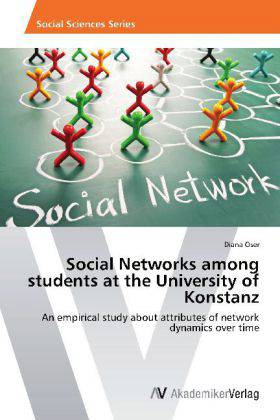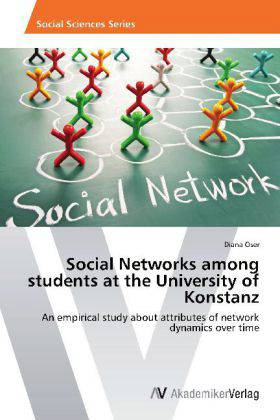
- Afhalen na 1 uur in een winkel met voorraad
- Gratis thuislevering in België vanaf € 30
- Ruim aanbod met 7 miljoen producten
- Afhalen na 1 uur in een winkel met voorraad
- Gratis thuislevering in België vanaf € 30
- Ruim aanbod met 7 miljoen producten
Zoeken
Social Networks among students at the University of Konstanz
An empirical study about attributes of network dynamics over time
Diana Oser
Paperback | Engels
€ 55,45
+ 110 punten
Omschrijving
Social networks are a highly discussed topic in social science but also in various other disciplines. Due to their diverse appearances, it is a challenge to find a common theory. There is the strategy of applying already existing theories on social networks. Following this strategy, social networks are treated as different variables, explanatory and dependent. This is why two mechanisms emerge, that constitute each other: influence and selection. In the first case, the network influences the behavior of its actors. In the second case, the network gets influenced by the actors' decisions. The aim of this study is to follow this approach by applying several studies to social networks and to test it with the dataset consisting of the sociology students at the University of Konstanz from 2006-2013. As method different networks were created and compared with their random ones to see if they differ. It became obvious that the student affiliation network emerged from the interests of the students and was structured by the curriculum of the university and developed a dynamic over time. A regression analysis showed that the student affiliation network had no significant influence on the study success of the students.
Specificaties
Betrokkenen
- Auteur(s):
- Uitgeverij:
Inhoud
- Aantal bladzijden:
- 140
- Taal:
- Engels
Eigenschappen
- Productcode (EAN):
- 9783639632163
- Verschijningsdatum:
- 16/06/2014
- Uitvoering:
- Paperback
- Formaat:
- Trade paperback (VS)
- Afmetingen:
- 152 mm x 229 mm
- Gewicht:
- 213 g

Alleen bij Standaard Boekhandel
+ 110 punten op je klantenkaart van Standaard Boekhandel
Beoordelingen
We publiceren alleen reviews die voldoen aan de voorwaarden voor reviews. Bekijk onze voorwaarden voor reviews.











